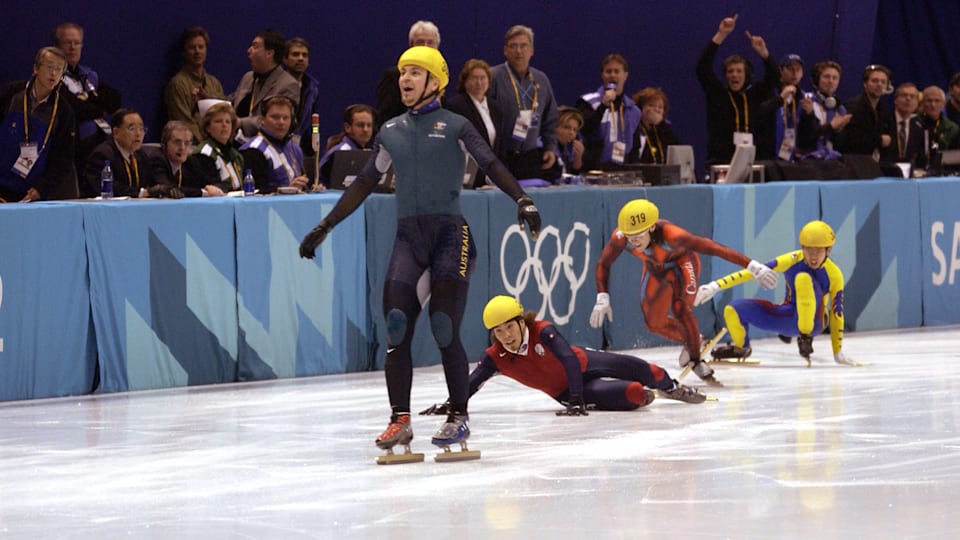Olympic Cinderellas: Steven Bradbury's unforgettable short track gold medal
At every edition of the Olympic Games, there are full of surprises. Some are far from winning medals at the Games but claim medals and inspire thousands of people. Olympics.com takes a look at the story of one of the luckiest wins in sporting history.

You can never be certain about what will happen until you cross the finish line. That’s short track in a nutshell.
Unlike long track speed skating, in short track, six skaters race against each other, bumping into each other as they jostle for position, which leads to regular crashes. The fact that they are required to wear helmets gives you some idea of the sometimes chaotic nature of the sport. And spectators are used to seeing thrilling, lightning-fast races where nobody knows what will happen until the very end.
In the men’s 1000m final at Salt Lake City 2002, the last four seconds changed everything. Read on for the unforgettable story of Steven Bradbury, who became the first Australian athlete to win a Winter Olympic gold medal.
Last man standing
Was there anyone who could have predicted this ending?
Steven Bradbury had competed at four Olympic Winter Games (Albertville 1992, Lillehammer 1994, Nagano 1998 and Salt Lake City 2002). However he had never excelled at any major competition, other than in relay events, prior to the Salt Lake City Games. Before 2002, the Australian’s highest finish in an individual Olympic competition was the eighth place he achieved in the 500m race at Lillehammer 1994. But that would all change in Salt Lake City where luck was very much on his side.
The then 28-year-old finished third in his 1000m quarter final but fortuitously progressed through to the semis when defending world champion Marc Gagnon of Canada was disqualified. In the semi-final, the Aussie skater was once again an underdog, however multiple skaters crashed out of the race, allowing him to pass through to the final.
Perhaps as a result of seeing what had happened to his unfortunate semi-final opponents, Bradbury decided to avoid the front group in the final to minimise the risk of crashing. At the beginning of the race, Bradbury kept a safe distance from the other four skaters, lagging behind them in last position. However, as they rounded the final corner, the race changed in an instant. Two of the leading skaters bumped into each other causing all four of the front-runners to fall.
Bradbury avoided the collision and passed by his unfortunate rivals to take gold. The last man standing had crossed the line in first place, all while his competitors lay strewn across the ice attempting to make it to the finish.
A medal won through blood, sweat and tears
Bradbury’s face was a picture of disbelief as he crossed the finish line and, after the race, he received his prize as a reward for the efforts he had made over his entire career.
"I'll accept this gold medal. But not for the 90 seconds of the race - I'm going to take it for the 14 years of hard work," he said.
As with many other athletes, Bradbury had needed to overcome injuries and disappointments over more than a decade in the sport. In 1995, he was involved in an accident in which he lost a large amount of blood and required over 100 stitches, after another skater’s blade accidentally cut his thigh. And just two years before the Salt Lake City Games, he broke two vertebrae in his neck in a training accident that almost ended his career.
So dedicating this title to hard work and persistence seemed the perfect way to accept the first-ever Olympic Winter Games gold medal won by an Australian athlete.
Who came second?
While the gold medal left a strong impression on the sporting world, the second-place finisher went on to become a legend in the sport.
As the four fallen skaters attempted to crawl to the finish line, the fastest of the quartet was local favourite Apolo Anton Ohno who managed to stretch out his leg to claim second place.
In contrast to Bradbury, who was approaching the end of his career, these Olympics marked Ohno’s debut at the Games. After winning this silver medal, Ohno went on to strike gold in the 1500m at Salt Lake City, before adding six more medals at Torino 2006 and Vancouver 2010.
